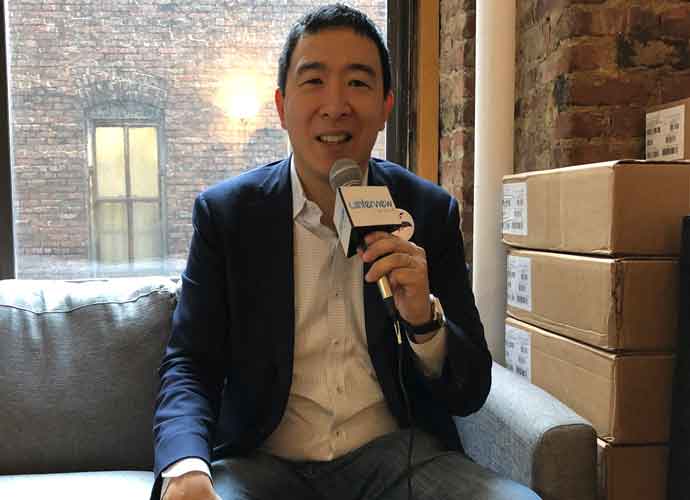

VIDEO EXCLUSIVE: 2020 Democratic Presidential Candidate Andrew Yang Explains Universal Basic Income (Photo: Erik Meers/uPolitics.com
The state of the American economy and job market will be one of the most crucial issues of the 2020 election cycle, and the Democratic presidential candidate are presenting bold plans to keep the economy strong while helping millions of Americans who have been left behind by the recovery.
Unemployment has been at a record 50-year low of around 3.7%, while 164,000 jobs were added in July to continue a record hirings streak and wages have continued to gradually grow.
Over the past few months, uPolitics has exclusively interviewed four Democratic 2020 presidential contenders — businessman Andrew Yang, former Rep. John Delaney (D-Maryland), former Colorado Gov. John Hickenlooper and self-help spiritual author Marianne Williamson — on this issue, among many others.
Watch here each candidate explain their economic plaform:
Subscribe to our free weekly newsletter!
A week of political news in your in-box.
We find the news you need to know, so you don't have to.
John Hickenlooper
“We need to protect workers in the workplace and make sure that workers are being paid a fair, livable wage in foreign countries when we’re competing,” said 67-year-old Hickenlooper, a moderate candidate and former entrepreneur who started a brewpub in Denver before becoming mayor of the city.
Hickenlooper also warned of the dangers of starting trade wars with other countries by imposing high tariffs on imports.
“The tariffs are the equivalent of every family and household in this country paying $800 to $1,200 [more] a year for the same stuff they were buying last year,” said Hickenlooper.
The former Colorado governor also emphasized the importance of developing job training and apprenticeship programs around the country in order to revitalize the economy.
SLIDESHOW: TOP DEMOCRATS RUNNING FOR PRESIDENT IN 2020
Marianne Williamson
Williamson emphasized right off the bat that the massive tax cut bill that the Republican Party passed in 2017 after President Donald Trump took office and the GOP controlled both houses of Congress must be eliminated.
“The first thing we need to do is to repeal the 2017 $2 trillion tax cut,” said Williamson. “Eighty-three cents of every dollar went to the richest individuals and corporations. We need to close those rather hideous corporate loopholes. You had $26 billion given in one year alone to the fossil fuel companies.”
The spiritual author also said she believes the federal government must do better to negotiate drug prices with pharmaceutical companies, and suggested imposing 3% and 2% tax rates on billionaires and on individuals who earn $500 million or more annually, respectively.
John Delaney
Delaney, 56, is another moderate Democratic candidate who believes investing in infrastructure and new technologies like artificial intelligence will help improve the economy. The Maryland Democrat also said he supports U.S. involvement in transnational trade deals like the Trans-Pacific Partnership, and added that making education and technical training more affordable would also propel the economy to higher levels.
“I would pursue a national infrastructure program. I believe [this] would really improve the U.S. economy,” said Delaney. “I’d enter in to the Trans-Pacific Partnership, which position the U.S. economy to succeed in Asia, which is the fastest-growing part of the global economy.”
He continued: “I’ve called for a national A.I. strategy, because we haven’t actually put in place the policies we need to prepare our workers for massive disruptions because of technological innovation.”
“Those kinds of things, together with making community college, career and technical training affordable,” Delaney added.
Delaney also said he supports increasing the Earned Income Tax Credit, a refundable tax credit for low-to-moderate-income working individuals and couples, especially those who have children. He said this would help families become less financially strained and avoid living paycheck to paycheck, and instead be able to afford things like their children’s education.
Andrew Yang
Yang, a progressive 44-year-old entrepreneur and venture capitalist from New York, has pushed ideas like Universal Basic Income (UBI), or the “freedom dividend,” in order to prop up the economy. Under the principle of UBI, every American household or individual would receive $1,000 per month guaranteed for their basic necessities, and Yang said he believes this would greatly help reduce income inequality in the United States.
“[This] would grow the consumer economy by around eight percent and create two million new jobs,” Yang told uPolitics exclusively. “It would improve children’s health, nutrition, graduation rates and make our population mentally stronger and more productive.”
Yang also stressed that as president, he would focus on protecting workers in industries who are more susceptible to being replaced by artificial intelligence and other technological advances through the process known as automation.
Republicans and Democrats have united their efforts to promote economic relief to Americans, especially those…
Unlike the FBI directors before him, Kash Patel seems to love the limelight. Last week,…
President Donald Trump insisted he's "not trolling" about his demands to acquire Greenland and make…
President Donald Trump criticized Ukrainian President Volodymyr Zelensky for refusing to acknowledge Russia's control of…
President Donald Trump invited the top 220 investors of his cryptocurrency, $Trump, to a private…
China has denied President Donald Trump's claims about trade talks with the United States as…